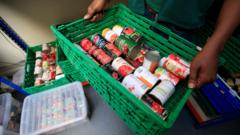Is Demand at Food Banks Reaching a Crisis Point?

Published: 2025-09-23 05:00:37 | Category: technology
The rising number of individuals experiencing hunger in the UK, now exceeding 14 million, highlights an urgent food insecurity crisis exacerbated by the ongoing cost of living challenges. Charities like Nourish Community Foodbank report that they are overwhelmed and struggling to meet the increasing demand, with many families turning to food banks for support.
Last updated: 27 October 2023 (BST)
Understanding the Food Insecurity Crisis in the UK
Food insecurity refers to the lack of reliable access to sufficient quantities of affordable, nutritious food. In the UK, the situation has reached alarming levels, with food banks reporting unprecedented demand. The Trussell Trust's recent statistics show a stark increase in the number of people unable to secure adequate food due to poverty, rising from 11.6 million in 2022 to over 14.1 million in the past year.
Key Takeaways
- Over 14 million people in the UK faced hunger in 2023, according to the Trussell Trust.
- Food banks like Nourish Community Foodbank are experiencing a crisis point due to increased demand and decreased donations.
- The cost of living crisis has significantly impacted the ability of individuals to donate food or money to food banks.
- The UK government has announced plans to tackle food bank dependence, including extending free school meals.
- Local initiatives, such as food voucher schemes, are being implemented but are not enough to meet the growing need.
The Role of Food Banks in the Community
Food banks play a critical role in providing emergency food supplies to those in need. Charities like Nourish Community Foodbank serve the Tunbridge Wells and south Tonbridge areas, offering essential support to families struggling to make ends meet. Dawn Stanford, the operations director at Nourish, highlights the gravity of the situation, stating that they are facing their worst crisis since the charity's inception 13 years ago.
Stanford noted a staggering 37% increase in referrals this year alone, a trend that reflects the escalating financial strains affecting many households. "We are facing hard decisions in the coming months to ensure we will be here next year," she said, signalling an urgent need for both financial and food donations.
The Impact of the Cost of Living Crisis
The ongoing cost of living crisis has placed immense pressure on families across the UK. With rising prices for essentials such as food, fuel, and housing, many individuals find themselves unable to provide for their families. As Stanford pointed out, the donations that once sustained food banks have significantly diminished. Previously, Nourish relied on community contributions for 100% of their supplies; now they are forced to purchase 75% of their stock.
This shift underscores the broader economic challenges facing the UK. Food inflation has led to higher prices in supermarkets, making it increasingly difficult for families on low incomes to afford basic necessities. Dominic Deeson, chairman of trustees at Faversham Food Bank, echoed these sentiments, noting that while they are still receiving donations, the situation is becoming precarious. "For the first time, we are asking people in Faversham to give us financial donations," he said, indicating a shift in how food banks are funded.
Government Response to Food Insecurity
In response to the rising food insecurity, the UK government has pledged to address the issue of food bank dependence. A recent statement from the Department for Work and Pensions (DWP) emphasised their commitment to tackling this challenge, noting initiatives such as extending free school meals to ensure that children do not go hungry during school holidays. The DWP indicated that a £1 billion fund would be allocated to reform crisis support, with a Child Poverty Taskforce set to publish an ambitious strategy later this year.
Despite these initiatives, many critics argue that more immediate action is needed to address the root causes of poverty and hunger. The government’s efforts may provide some relief, but without substantial changes to welfare support and economic policies, food banks will likely continue to see increased demand.
Local Initiatives and Community Support
Local councils are also stepping up to provide support amidst growing food insecurity. Kent County Council (KCC) initiated a food voucher scheme aimed at helping struggling families, though applications closed on 26 August. Such initiatives are crucial in providing immediate relief, but they highlight the need for sustainable, long-term solutions to food poverty.
As food banks struggle to cope with the rising tide of hunger, community support becomes increasingly important. Local businesses, community groups, and individuals can all play a role in ensuring that food banks have the resources they need. Whether through financial donations or food drives, every bit helps to alleviate the burden faced by those in need.
The Future of Food Banks in the UK
As we look ahead, the future of food banks in the UK remains uncertain. With the ongoing economic pressures and rising living costs, many predict that the demand for food banks will continue to grow. Charities like Nourish and Faversham Food Bank are doing their best to adapt, but they need support to meet the needs of their communities.
Challenges Ahead
For food banks, the challenges are multifaceted. Increased demand combined with dwindling donations creates a perfect storm. Many food banks are reaching a tipping point where they may need to purchase food to keep up with demand. This not only puts financial strain on the organisations but also raises questions about their sustainability moving forward.
The community's response will be crucial in the coming months. Without robust support, food banks risk being unable to fulfil their mission of providing emergency food aid. It is essential that both individuals and organisations step up to support these vital services.
Conclusion: A Call for Action
As food insecurity continues to escalate in the UK, it is clear that the problem requires urgent attention and action. The combined efforts of government initiatives, local councils, and community support can make a significant difference. However, more must be done to address the underlying issues that lead to food poverty.
As individuals, we can contribute by supporting our local food banks, whether through donations or volunteering our time. Every action counts, and together we can help ensure that no one in our community goes hungry. How can you contribute to helping those in need in your area?
#FoodInsecurity #CommunitySupport #UKFoodBanks
FAQs
What is food insecurity?
Food insecurity refers to a lack of reliable access to sufficient quantities of affordable and nutritious food. It affects millions of people in the UK, leading to increased dependence on food banks.
How many people are currently facing hunger in the UK?
Recent statistics indicate that over 14 million people in the UK faced hunger in the past year, a significant increase from 11.6 million in 2022, largely due to poverty and the cost of living crisis.
What are food banks doing to cope with increased demand?
Food banks are adapting by seeking more financial donations, purchasing food to meet demand, and relying on community support to sustain their operations amid rising referrals.
What is the UK government doing about food bank dependence?
The UK government has announced initiatives such as extending free school meals and allocating £1 billion for crisis support reform, aiming to address the root causes of food poverty.
How can I support my local food bank?
You can support your local food bank by donating food, financial contributions, or volunteering your time. Every effort helps ensure that those in need can access essential food supplies.



